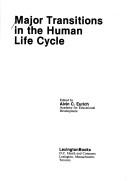| Listing 1 - 10 of 11 | << page >> |
Sort by
|
Book
Year: 1969 Publisher: New York, N.Y. Delacorte
Abstract | Keywords | Export | Availability | Bookmark
 Loading...
Loading...Choose an application
- Reference Manager
- EndNote
- RefWorks (Direct export to RefWorks)
Sociology of education --- Higher education --- United States of America

ISBN: 0669045594 Year: 1981 Publisher: Lexington Lexington books
Abstract | Keywords | Export | Availability | Bookmark
 Loading...
Loading...Choose an application
- Reference Manager
- EndNote
- RefWorks (Direct export to RefWorks)
Life change events --- Life cycle, Human --- Human Development --- Life Change Events --- Congresses
Book
Abstract | Keywords | Export | Availability | Bookmark
 Loading...
Loading...Choose an application
- Reference Manager
- EndNote
- RefWorks (Direct export to RefWorks)
Book
Year: 1970 Publisher: New York (N.Y.): Pitman,
Abstract | Keywords | Export | Availability | Bookmark
 Loading...
Loading...Choose an application
- Reference Manager
- EndNote
- RefWorks (Direct export to RefWorks)
Book
Year: 1942 Publisher: New York (N.Y.): Appleton-Century-Crofts
Abstract | Keywords | Export | Availability | Bookmark
 Loading...
Loading...Choose an application
- Reference Manager
- EndNote
- RefWorks (Direct export to RefWorks)
Book
Abstract | Keywords | Export | Availability | Bookmark
 Loading...
Loading...Choose an application
- Reference Manager
- EndNote
- RefWorks (Direct export to RefWorks)
Several years ago, University of Minnesota alumni in teaching positions were asked by Professor W.E. Peik for an evaluation of certain of the professional courses in which they had been enrolled as students. They placed educational psychology first for helpfulness in educational thinking. The text in hand is an outgrowth of this course and follows closely its major objectives: 1. To provide a knowledge of techniques that may be used in acquiring a greater understanding of an individual pupil or of a group of pupils. 2. To provide a summary of the knowledge about pupils in and out of school that has accumulated from the application of the research techniques to educational and psychological problems. 3. To develop in teachers an attitude whereby each pupil and each learning situation is regarded as unique. To achieve these ends, the discussion throughout the book is organized about three general problems: (1) the measurement of abilities, achievements, and other aspects of personality; (2) individual differences and differentiated instruction; and (3) learning. Not all the subtopics relevant to these three problems have been covered thoroughly, to be sure. The portions omitted or treated briefly were dealt with in this manner either (1) because they were regarded as unimportant from the practical point of view, or (2) because relatively little is known about them. For example, the writers are fully aware that the treatment given to the topic of emotions is inadequate. But, in terms of what is known about the emotions, it would be difficult to extend the treatment without running into sheer speculation, which, if applied in the classroom, may be distinctly harmful. In contrast with several educational psychologies that have appeared within the past year or two, this book leans throughout upon research findings. A factual basis is provided for child-centered as well as social thinking about educational problems. While speculation is not ruled out, the writers are convinced that educational problems can be solved more effectively if the solutions proffered have factual support. Students, then, must be fortified in their thinking by a knowledge of the available facts. Some material entirely new to books on educational psychology has been included. Because of the evidence that has gradually accumulated concerning the problem of esthetics in education, a chapter summarizing the progress to date is introduced. There are chapters on the subnormal, the maladjusted, and the intellectually gifted. The chapters on measurement emphasize tests of the specific outcomes of education. In the section on learning, the basic principles evolved from experimental results are discussed. The so-called 'laws of learning' are regarded as having been prematurely and unwarrantably fixed. Each learning situation is considered as unique, with numerous conditions operating in relation to one another to make the situation effective or to interfere with optimal learning. Thus, the attitude of relativity rather than constancy in learning is stressed.
Book
Year: 1968 Publisher: New York: Delta,
Abstract | Keywords | Export | Availability | Bookmark
 Loading...
Loading...Choose an application
- Reference Manager
- EndNote
- RefWorks (Direct export to RefWorks)
Book
Year: 1960 Publisher: New York : Harper,
Abstract | Keywords | Export | Availability | Bookmark
 Loading...
Loading...Choose an application
- Reference Manager
- EndNote
- RefWorks (Direct export to RefWorks)
Book
Year: 1960 Publisher: New York, NY : Harper and brothers,
Abstract | Keywords | Export | Availability | Bookmark
 Loading...
Loading...Choose an application
- Reference Manager
- EndNote
- RefWorks (Direct export to RefWorks)
Book

ISBN: 9780674423305 Year: 2013 Publisher: Cambridge, MA
Abstract | Keywords | Export | Availability | Bookmark
 Loading...
Loading...Choose an application
- Reference Manager
- EndNote
- RefWorks (Direct export to RefWorks)
| Listing 1 - 10 of 11 | << page >> |
Sort by
|

 Search
Search Feedback
Feedback About UniCat
About UniCat  Help
Help News
News